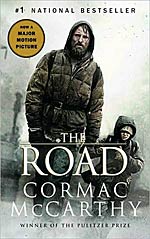
![]() Sable Aradia
Sable Aradia
5/22/2018
![]()
Read for the Apocalypse Now Reading Challenge.
For me, this book was a resounding meh.
I have read an awful lot of post-apocalyptic fiction. For me, Pulitzer Prize or not, this book added nothing new to the genre. It's beautifully written, don't get me wrong, but in places it's downright pretentious and the ideas are not original. All I have to say is, FFS literary people; please read some science fiction that's actually written by science fiction writers. You keep giving undeserved awards out for originality because you don't know the genre and have never read anything about it. You sneer at genre fiction so you don't read it (so how you can presume to sneer at it, I fail to understand). At least familiarize yourself with the genre you presume to critique.
Okay, so moving on from my soapbox. I like the style here. What I don't like is a) the utterly illogical nature of the world McCarthy has created b) the pretentious language c) the pointlessness.
A man and his son are moving south to the coast through a post-apocalyptic world. I get the feeling that it was caused by nuclear war, because there was a reference to a flashback where he sees a rosy flash of light at a distance. The thermonuclear war is sufficiently global to have made ash out of most of the landscape and to have killed ALL the plant life and caused nuclear winter. This is made clear again and again in repetitive description.
Except that this global thermonuclear war did not incinerate bodies or any manmade structure. The man and the boy (never named) are surviving by breaking into the ruins of houses and taking whatever canned goods they can find. And there aren't many of them, because it's maybe eight or ten years after the disaster. We know this because the boy was still a fetus when it happened. The mother is dead. She went off somewhere, presumably to take her own life - or at least, that's what she said she was going to do.
Of course human structures are decaying. In some places, they were blasted out; in others, the structures were damaged enough by heat to be a bit off-kilter. In other places, people and their belongings were partially melted into the road, but their bodies weren't incinerated. WTF? Fine with the decay; that happens, we know that. But some of it is in part caused by rot, and there'd be very little rot in a world that has no mold, likely few bacteria, and no animals, not even insect life. He has exactly zero understanding of the science. Please do some research.
People are understandably getting desperate. It seems that most have resorted to cannibalism, even hunting one another for food. The pair spends most of the book avoiding the other people for this reason. The big ethical dilemma appears to be whether or not the man will do the same to save his son, or if they'll remain "the good guys."
For a while the book grew on me. I decided that the landscape was a metaphor for bankrupt human morality. The man talks about saving and helping people, but routinely abandons others for the sake of himself and his son. The son calls him on it.
The man is also sick. This does not surprise me because I'm sure there's radioactive dust everywhere. He coughs, and the coughing continues to get worse. But the boy doesn't get sick. Why not? Radiation poisoning is harder, not easier, on the young, and if things were that bad, and that global, Chernobyl should tell us that the boy, at least, was likely to have been born with some significant birth defects, and it would be a miracle if anybody left were fertile at all. Again - science, research.
In other words, I can't see that there's any possible future for the human race in this world. So what's the point?
But the book completely lost me at the ending. No spoilers, but it was sudden, seemed pointless and improbable, and came out of nowhere. If I wrote a book like this, because I'm not already considered a "respected literary writer," no publisher would publish it, and my rejection letters would likely be nasty. Stuff along the line of "learn how to write." So why do we give a man who's supposed to be such a master a pass on it?
So if you're reading for language - sure, this was cool. But otherwise, I suggest you give this one a pass.
http://www.dianemorrisonfiction.com